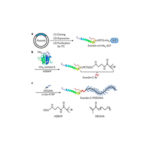 Researchers from Duke University have reconfigured the popular drug-delivery polymer, polyethylene glycol, to sidestep dangerous immune responses that have previously halted clinical trials. The team’s work was published in Nature Biomedical Engineering.
Researchers from Duke University have reconfigured the popular drug-delivery polymer, polyethylene glycol, to sidestep dangerous immune responses that have previously halted clinical trials. The team’s work was published in Nature Biomedical Engineering.
Polyethylene glycol, PEG, is a polymer that is found in toothpaste and cosmetics, but is often used in pharmaceuticals. It can be attached to active drugs in the bloodstream, thus slowing the body’s ability to clear them and lengthening the duration that the drug can be useful.
But because this polymer is so widely used, many people have developed antibodies to the polymer, which can cause allergic reactions when the PEG-modified drugs are introduced to the body. The team at Duke created an modified version of PEG that can avoid recognition by antibodies.
Bruce Sullenger, a professor of experimental surgery and director of the Duke Translational Research Institute, knows firsthand the problems that can come with PEG antibodies. During a late-stage clinical trial that involved a PEG drug delivery system, 10 patients had an anaphylactic immune reaction to the PEG and the trials were immediately shut down.
“These allergic reactions stopped the development of an otherwise very promising approach to control blood clotting while limiting bleeding,” Sullenger said. “Because people with pre-existing PEG antibodies are now present in the population and such antibodies can elicit life-threatening allergic reactions, it has become critical for drug development to create alternative formulations of PEG.”
Ashutosh Chilkoti, a professor of biomedical engineering, heard of Sullenger’s problem and wondered if his modified-PEG system would work. Chilkoti teamed up with a professor from the Duke University School of Medicine who has been involved with PEG technology since 1990. On the team’s 2nd try at designing a modified-PEG system, the antibodies left it alone.
The team then attached the polymer to a type 2 diabetes drug and injected it into diabetic mice. The team observed no loss of efficacy and the effects of 1 drug was extended 16-fold.
Next, the researchers hope to test for immunological responses in living animals with PEG antibodies and determine whether new antibodies will be made against these modified polymers.

